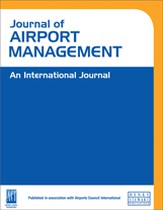A conceptual design framework to incorporate flexibility in airport terminals
Abstract
Airport terminals go through frequent transformations to accommodate technological advancements as well as changes in regulations. The ever-growing aviation industry requires airport terminals to be planned, designed and constructed in a way that will allow flexible operating conditions. The current paper revisits the significance of the ‘flexible design’ concept, which has been applied considerably in residential and commercial buildings, but not in airport terminals. This paper proposes a hypothetical design framework, Flexible Design Framework for Airport Terminals (FlexDFA) utilising available flexible design strategies; it is envisaged that this strategy will assist designers in developing flexible spatial layouts at the early stage of a design process. The development of flexible layout exploits the passenger process models to uncover the implicit relationship between the spatial layout of a terminal building and its corresponding passenger activities. The proposed concept also identifies a number of design parameters to qualitatively evaluate the essential flexibility of a terminal design.
The full article is available to subscribers to the journal.
Author's Biography
Sarah Shuchi received her PhD from the Creative Industries faculty, Queensland University of Technology, Brisbane, Australia. Her area of specialisation is in the field of flexible design philosophies, with particular focus on airport terminals. Her PhD research demonstrated a possible use of business process models in achieving more efficient and effective design solutions for airport terminals. She also identified a number of flexible design parameters and their relative significance in design to achieve flexibility.
Robin Drogemuller is a professor at Queensland University of Technology, Brisbane, Australia. He has been involved in research into the digital representation of buildings for over 20 years. Professor Drogemuller has been engaged in the development of Building Information Modelling (BIM)-based software to support parametric design, environmental design, construction planning and facilities management.
Laurie Buys is a professor at Queensland University of Technology, Brisbane, Australia. Her main research interests fall under the broad headings of social sustainability and social gerontology, focusing specifically on issues associated with community engagement, corporate social responsibility, sustainable buildings and active ageing.
